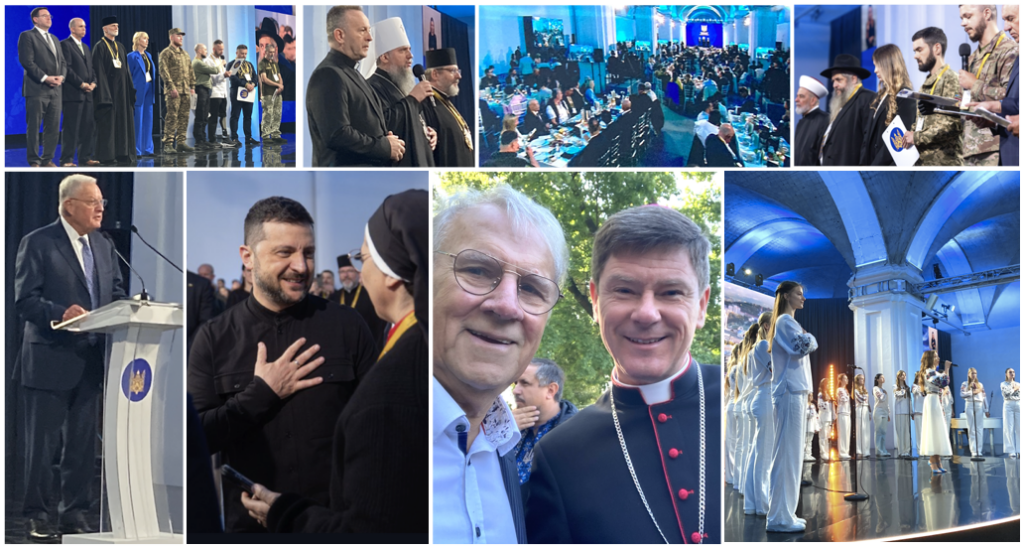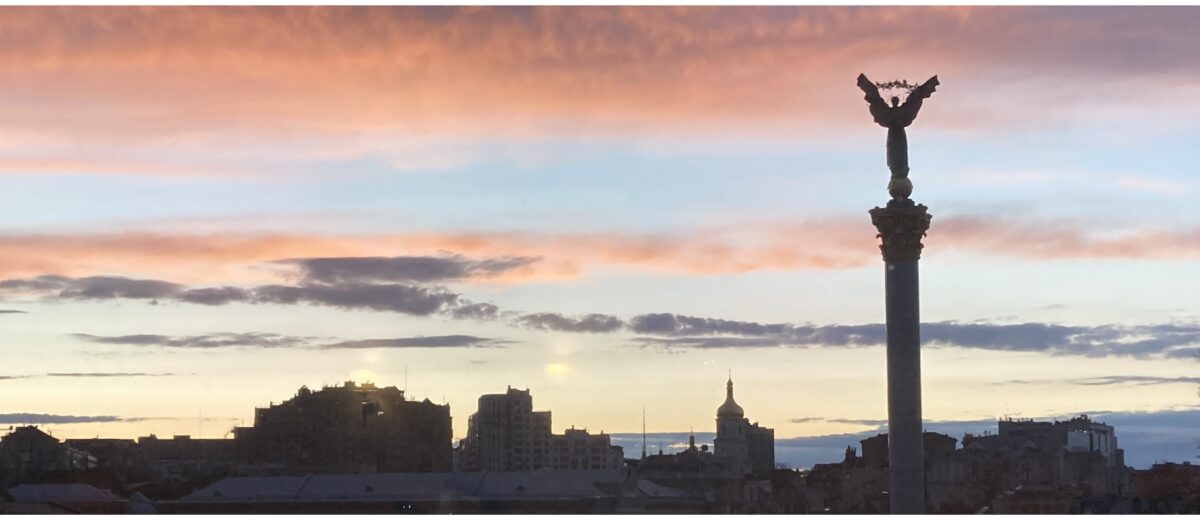Despite the relative quiet of the skies over Kyiv last weekend, reminders were everywhere that Ukraine was a country under ruthless attack standing on the frontline of the global struggle for freedom.
Billboards along the roads and notices in public toilets recruited for army regiments. Photo displays in public parks reminded passers-by of those killed in action or innocent victims of terrorist attacks. A profusion of flags and photos in Maidan Square in the heart of Kyiv spoke of the resilience and sacrifice of a whole nation where everyone has suffered loss. My host and driver Sasha pointed out photos of those with whom he had gone to school or played football.
Six years had passed since I was last in Maidan and had seen similar memorials to victims of Putin’s insurrection in the eastern oblasts since 2014. But now the numbers had tragically multiplied. I recalled then standing in Maidan as the cold realisation had crept over me that Putin could not afford to allow a free, democratic nation to prosper on his southern border. I had suppressed the thought that that would mean an invasion one day. And perhaps rockets invading these very skies, destroying these very buildings. I didn’t want to go there.
And that has been the West’s reaction to the many signals Putin gave of his intention to restore Russky Mir, Russian dominance over the nations of the former Soviet Union – and beyond. In the democratic West we had hoped that deepening economic ties with Russia would help build trust and sustainable peace – while Putin was accumulating resources for another war.
The day after I and several hundred foreign guests left Kyiv after attending the Ukrainian National Prayer Breakfast last Monday, Putin unleashed the second biggest attack ever on the capital. Explosions rocked the city as Russia attacked civilian targets with some 600 drones and 30 ballistic missiles, damaging apartment buildings, offices and schools, killing and wounding men, women and children.
The shameful red-carpet presidential reception in Alaska of a war criminal wanted by the International Criminal Justice Court had yielded nothing – except the defusion of threats of heavier sanctions.

Kyiv residents joke that their best defensive weapon has been the presence of Keith Kellogg, US Special Envoy for Ukraine and Russia, dubbing him ‘St Kellogg’. His departure after attending Independence Day celebrations of Sunday and addressing Monday’s Prayer Breakfast appeared to be the signal to resume the criminal attacks on civilian targets.
In his talk to the one thousand participants at the breakfast, he quoted Psalm 10:17-18 about God hearing ‘the desire of the afflicted; you encourage them, and you listen to their cry, defending the fatherless and the oppressed, so that mere earthly mortals will never again strike terror.’
Cheekily I later slipped across to his table to thank him for his encouragement, and urged him to do everything possible to influence American policy to be far more supportive of Ukraine. “I hope so!” he replied emphatically.
Soldiers and family members of fallen heroes, volunteers, chaplains, public figures, representatives of churches and religious organisations, were joined at the breakfast by some 350 invited foreign guests from 50 countries.
President Zelensky emphasised the importance for Ukrainians to feel the support through military assistance and prayers. He thanked those present for spreading the truth about the war and for uniting people around the world in support.
“Today, the battle between good and evil is still ongoing. Together we will achieve a peace that will be enduring and lasting. That is what all our prayers are for today – spoken today by our friends from various faith communities, from different continents.”
From Rome, Pope Leo XIV joined the Global Day of Prayer, called for by the All Ukraine Council of Churches and Religious Organisations for Independence Day on Sunday, praying for the end of the war, for a just and lasting peace, for protection from Russian attacks, for the return of all prisoners and children, and for the healing of the wounded. He expressed his ‘closeness to the entire Ukrainian people, who are experiencing their daily Golgotha’.

My four-day visit to Ukraine enabled me to visit leaders of the YWAM centre in Kyiv on the banks of the Dnieper river, still actively training and mobilising young people from Ukraine and far beyond. Projects included chaplaincy support, building ‘tiny houses’, evangelism and humanitarian relief. Meeting Iryna Kapitinova, author of a poignant daily journal of war-torn Ukraine, Tulips and Ashes, and seeing the impressive work of the school where she teaches under the pressures of war, was a special highlight. I and many others have been riveted by her on-the-spot despatches from bomb-shelters and corridors during long anxious night attacks, wrestling like the Psalmist with the question, ‘How long, O Lord?’

A lasting takeaway from this trip was the discovery of the rich heritage of the Ukrainian Greek Catholic Church (UGCC), and in particular the influence of Metropolitan Andrey Sheptytsky (1865–1944) who dedicated his life to spreading the Gospel and promoting peace. One of the most influential churchmen in modern Ukrainian history, he foresaw that Ukraine’s survival depended not only on political independence but on spiritual and moral renewal.
My first appointment on reaching Kyiv was at the newly-built UGCC cathedral, to meet with two key members of the Transform Ukraine movement I have become involved with recently, Fr Oleksa Petriv and Mykhaylo Khariy. Fr Oleksa and I co-moderated the global zoom meeting of faith networks to launch the Global Day of Prayer, but we had not yet met in person. Both men are members of the UGCC and introduced me to the writings of Sheptytsky, who is looking over my shoulder from the painting on the wall in the photo below.
His short but powerful pastoral booklet, ‘Як упорядкувати свій дім‘ (‘How to put your house in order’), offers guidance for individuals, families, and for nation-building, a primer in public theology. They also introduced me to a pastoral letter from the current Metropolitan, Sviatoslav Shevchuk, perhaps the most insightful analysis of the war I have read, explaining its root causes and the moral principles and foundations on which a just and lasting peace can be built.
In a Weekly Word Extra later this week I will give summaries and links to both these men’s writings, valuable sources for reflection in these difficult days.

Till next week,



So good to see people of faith and action coming together in prayer in the face of evil and chaos. Inspiring! Where do you find all these wonderful books and articles, Jeff?
I searched for Sheptytsky but could find his book online. Any suggestions?
thanks Jeff for this report. Having been in Ukraine 4 times this past year (last time was last July), it is so good to read about the prayer day breakfast. We knew about it, prayed, but didn’t get any feedback. So, now we did.
Great to read also about the YWAM base still functioning. Bless them! and bless you.